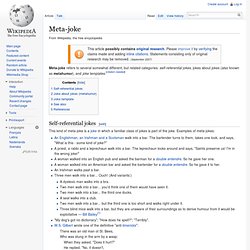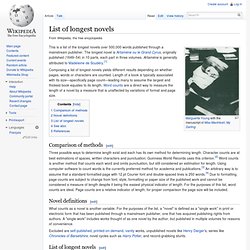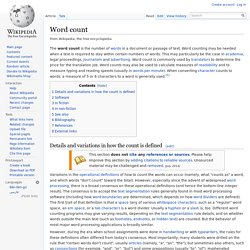

Meta-joke. Meta-joke refers to several somewhat different, but related categories: self-referential jokes, jokes about jokes (also known as metahumor), and joke templates.

[citation needed] Self-referential jokes[edit] This kind of meta-joke is a joke in which a familiar class of jokes is part of the joke. Examples of meta-jokes: [edit] Marc Galanter in the introduction to his book Lowering the Bar: Lawyer Jokes and Legal Culture cites a meta-joke in a speech of Chief Justice William Rehnquist:[4] I've often started off with a lawyer joke, a complete caricature of a lawyer who's been nasty, greedy, and unethical.
E.B. Another kind of metahumor is when jokes make fun of poor jokes by replacing a familiar punchline with a serious or nonsensical alternative. Joke template[edit] This kind of meta-joke is a sarcastic jab at the fact that some jokes are endlessly refitted, often by professional jokers, to different circumstances or characters without significant innovation in the humour.[7] —Bill Bailey[1] List of longest novels. This is a list of the longest novels over 500,000 words published through a mainstream publisher.

The longest novel is Artamène ou le Grand Cyrus, originally published (1649–54) in 10 parts, each part in three volumes. Artamène is generally attributed to Madeleine de Scudéry.[1] Composing a list of longest novels yields different results depending on whether pages, words or characters are counted. Length of a book is typically associated with its size—specifically page count—leading many to assume the largest and thickest book equates to its length.
Word counts are a direct way to measure the length of a novel by a measure that is unaffected by variations of format and page size. Comparison of methods[edit] Three possible ways to determine length exist and each has its own method for determining length. Novel definitions[edit] What counts as a novel is another variable. Length of a novel. §Details and variations in how the count is defined[edit] §Software[edit] As explained earlier, different word counting programs may give varying results, depending on the text segmentation rule details.

The exact number of words often is not a strict requirement, thus the variation is acceptable. §In fiction[edit] Novelist Jane Smiley suggests that length is an important quality of the novel.[5] However, novels can vary tremendously in length; Smiley lists novels as typically being between 100,000 and 175,000 words,[6] while National Novel Writing Month requires its novels to be at least 50,000 words. The Science Fiction and Fantasy Writers of America specifies word lengths for each category of its Nebula award categories:[11] §In non-fiction[edit] The acceptable length of an academic dissertation varies greatly, dependent predominantly on the subject.
§See also[edit]